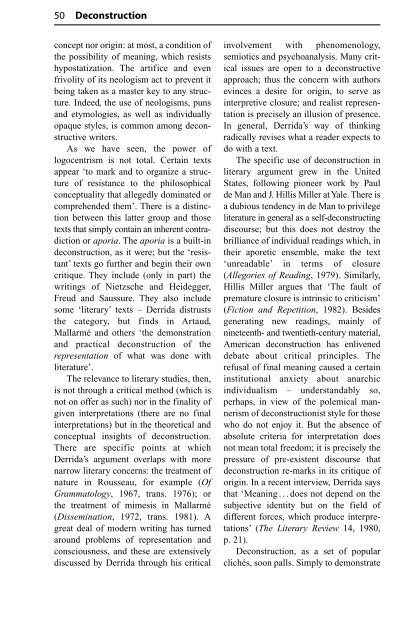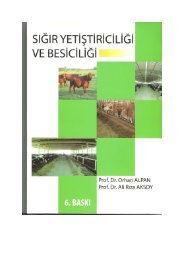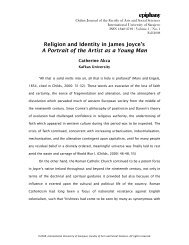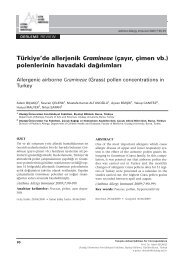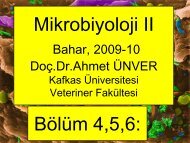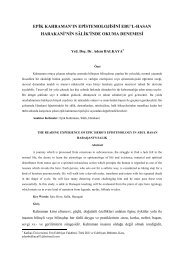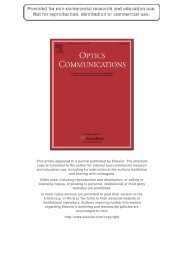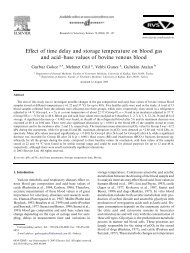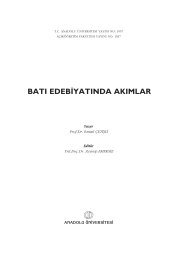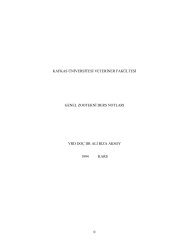The Routledge Dictionary of Literary Terms
The Routledge Dictionary of Literary Terms
The Routledge Dictionary of Literary Terms
Create successful ePaper yourself
Turn your PDF publications into a flip-book with our unique Google optimized e-Paper software.
50 Deconstruction<br />
concept nor origin: at most, a condition <strong>of</strong><br />
the possibility <strong>of</strong> meaning, which resists<br />
hypostatization. <strong>The</strong> artifice and even<br />
frivolity <strong>of</strong> its neologism act to prevent it<br />
being taken as a master key to any structure.<br />
Indeed, the use <strong>of</strong> neologisms, puns<br />
and etymologies, as well as individually<br />
opaque styles, is common among deconstructive<br />
writers.<br />
As we have seen, the power <strong>of</strong><br />
logocentrism is not total. Certain texts<br />
appear ‘to mark and to organize a structure<br />
<strong>of</strong> resistance to the philosophical<br />
conceptuality that allegedly dominated or<br />
comprehended them’. <strong>The</strong>re is a distinction<br />
between this latter group and those<br />
texts that simply contain an inherent contradiction<br />
or aporia. <strong>The</strong> aporia is a built-in<br />
deconstruction, as it were; but the ‘resistant’<br />
texts go further and begin their own<br />
critique. <strong>The</strong>y include (only in part) the<br />
writings <strong>of</strong> Nietzsche and Heidegger,<br />
Freud and Saussure. <strong>The</strong>y also include<br />
some ‘literary’ texts – Derrida distrusts<br />
the category, but finds in Artaud,<br />
Mallarmé and others ‘the demonstration<br />
and practical deconstruction <strong>of</strong> the<br />
representation <strong>of</strong> what was done with<br />
literature’.<br />
<strong>The</strong> relevance to literary studies, then,<br />
is not through a critical method (which is<br />
not on <strong>of</strong>fer as such) nor in the finality <strong>of</strong><br />
given interpretations (there are no final<br />
interpretations) but in the theoretical and<br />
conceptual insights <strong>of</strong> deconstruction.<br />
<strong>The</strong>re are specific points at which<br />
Derrida’s argument overlaps with more<br />
narrow literary concerns: the treatment <strong>of</strong><br />
nature in Rousseau, for example (Of<br />
Grammatology, 1967, trans. 1976); or<br />
the treatment <strong>of</strong> mimesis in Mallarmé<br />
(Dissemination, 1972, trans. 1981). A<br />
great deal <strong>of</strong> modern writing has turned<br />
around problems <strong>of</strong> representation and<br />
consciousness, and these are extensively<br />
discussed by Derrida through his critical<br />
involvement with phenomenology,<br />
semiotics and psychoanalysis. Many critical<br />
issues are open to a deconstructive<br />
approach; thus the concern with authors<br />
evinces a desire for origin, to serve as<br />
interpretive closure; and realist representation<br />
is precisely an illusion <strong>of</strong> presence.<br />
In general, Derrida’s way <strong>of</strong> thinking<br />
radically revises what a reader expects to<br />
do with a text.<br />
<strong>The</strong> specific use <strong>of</strong> deconstruction in<br />
literary argument grew in the United<br />
States, following pioneer work by Paul<br />
de Man and J. Hillis Miller at Yale. <strong>The</strong>re is<br />
a dubious tendency in de Man to privilege<br />
literature in general as a self-deconstructing<br />
discourse; but this does not destroy the<br />
brilliance <strong>of</strong> individual readings which, in<br />
their aporetic ensemble, make the text<br />
‘unreadable’ in terms <strong>of</strong> closure<br />
(Allegories <strong>of</strong> Reading, 1979). Similarly,<br />
Hillis Miller argues that ‘<strong>The</strong> fault <strong>of</strong><br />
premature closure is intrinsic to criticism’<br />
(Fiction and Repetition, 1982). Besides<br />
generating new readings, mainly <strong>of</strong><br />
nineteenth- and twentieth-century material,<br />
American deconstruction has enlivened<br />
debate about critical principles. <strong>The</strong><br />
refusal <strong>of</strong> final meaning caused a certain<br />
institutional anxiety about anarchic<br />
individualism – understandably so,<br />
perhaps, in view <strong>of</strong> the polemical mannerism<br />
<strong>of</strong> deconstructionist style for those<br />
who do not enjoy it. But the absence <strong>of</strong><br />
absolute criteria for interpretation does<br />
not mean total freedom; it is precisely the<br />
pressure <strong>of</strong> pre-existent discourse that<br />
deconstruction re-marks in its critique <strong>of</strong><br />
origin. In a recent interview, Derrida says<br />
that ‘Meaning...does not depend on the<br />
subjective identity but on the field <strong>of</strong><br />
different forces, which produce interpretations’<br />
(<strong>The</strong> <strong>Literary</strong> Review 14, 1980,<br />
p. 21).<br />
Deconstruction, as a set <strong>of</strong> popular<br />
clichés, soon palls. Simply to demonstrate


